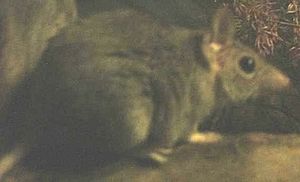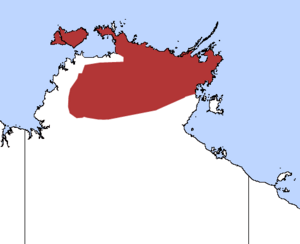Fawn antechinus facts for kids
Quick facts for kids Fawn antechinus |
|
|---|---|
 |
|
| Conservation status | |
| Scientific classification |
|
| Kingdom: | Animalia |
| Phylum: | Chordata |
| Class: | Mammalia |
| Infraclass: | Marsupialia |
| Order: | Dasyuromorphia |
| Family: | Dasyuridae |
| Genus: | Antechinus |
| Species: |
A. bellus
|
| Binomial name | |
| Antechinus bellus (Thomas, 1904)
|
|
 |
|
| Distribution of the fawn antechinus | |
| Script error: The function "autoWithCaption" does not exist. | |
Script error: No such module "Check for conflicting parameters".
The fawn antechinus (Antechinus bellus) is a small, meat-eating marsupial found in northern Australia. It is the only type of Antechinus that lives in the Northern Territory. This animal has a scattered and limited home range. Local Indigenous people, the Kunwinjku of western Arnhem Land, call this animal Mulbu.
Contents
Meet the Fawn Antechinus
The fawn antechinus was first collected by John T. Tunney. It was officially described in 1904 by a famous scientist named Oldfield Thomas. He gave it the name bellus, which means "beautiful." This animal has always been easy to tell apart from other species.
It belongs to a family called Dasyuridae. This family includes many marsupials that eat meat. The fawn antechinus is also part of the genus Antechinus. This name means "hedgehog-equivalent." There are nine other members in this group.
Appearance and Diet
The fawn antechinus looks different from its relatives because it is much lighter in color. It has a light grey fur. You can tell it apart from other similar animals in its area, like the sandstone dibbler or the red-cheeked dunnart, because it is bigger and paler.
This animal is an insectivore, which means it mainly eats insects. Like many other antechinus species, all the males of this species die after the breeding season.
Life Cycle and Reproduction
The fawn antechinus has its breeding season in August. The baby antechinuses are born in September or October. A mother can have up to ten babies in one litter. The young are usually old enough to stop drinking their mother's milk by January.
Where the Fawn Antechinus Lives
The fawn antechinus lives in the Top End region of the Northern Territory in Australia. It is quite common in this area. It prefers to live in tall, open forests in tropical climates.
See also
 In Spanish: Antequino gamuza para niños
In Spanish: Antequino gamuza para niños
 | James Van Der Zee |
 | Alma Thomas |
 | Ellis Wilson |
 | Margaret Taylor-Burroughs |


